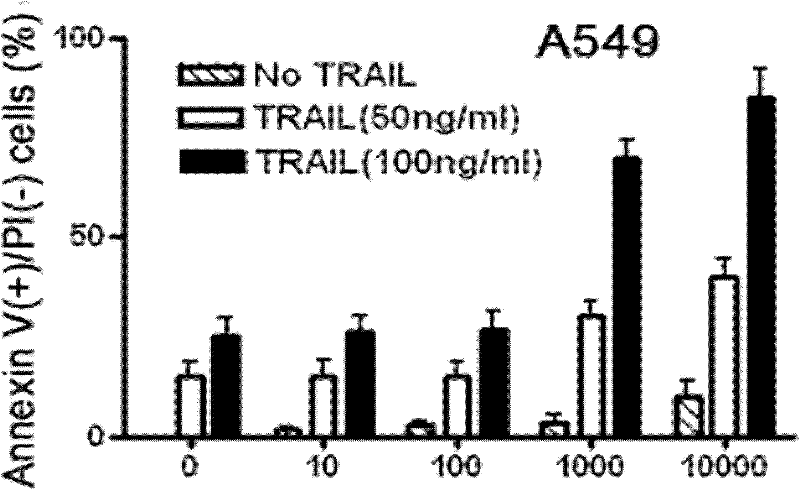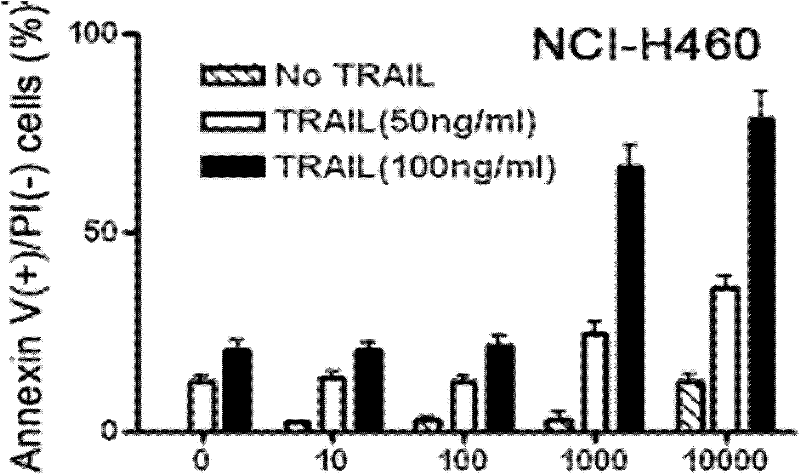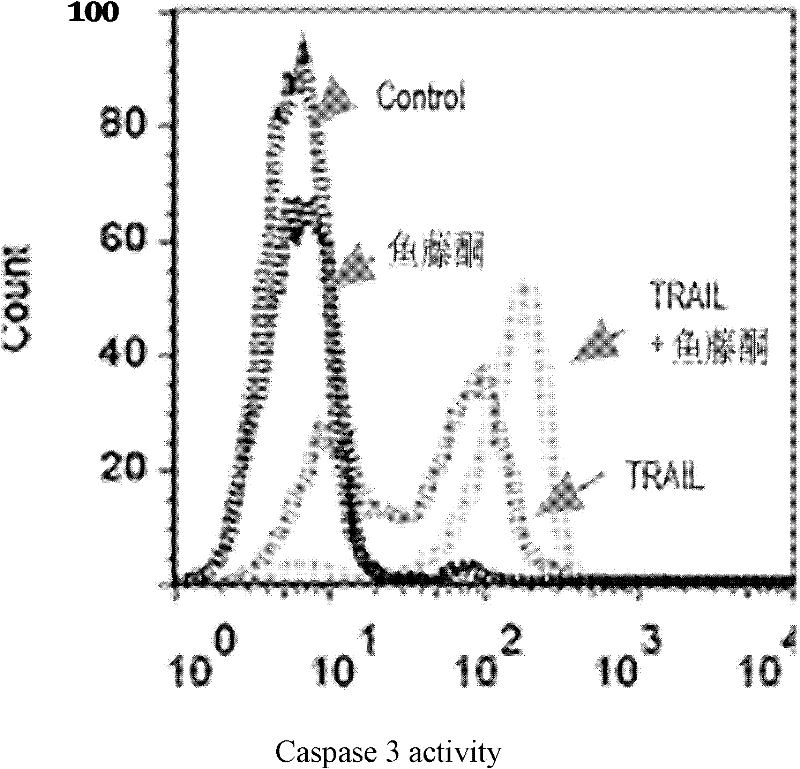Use of rotenone as non-small cell lung cancer cell sensitizer
A non-small cell lung cancer, rotenone technology, applied in the field of application of rotenone combined with TRAIL in the preparation of drugs for the treatment of non-small cell lung cancer, can solve the problem of TRAIL tolerance and other problems
- Summary
- Abstract
- Description
- Claims
- Application Information
AI Technical Summary
Problems solved by technology
Method used
Image
Examples
Embodiment 1
[0018] Example 1 The effect of rotenone on the death of non-small cell lung cancer cells (A549) induced by TRAIL. CO 2 moist sterile environment. When the cells grow to 80%-90% confluent, they are washed twice with PBS and digested with 0.25% trypsin. According to the cell volume 6×10 4 Each well was seeded in a 24-well cell culture plate. After the cells have grown completely attached to the wall, add the following drugs: TRAIL 50ng / ml, TRAIL 100ng / ml, rotenone 10nM, TRAIL 50ng / ml+rotenone 10nM, TRAIL 100ng / ml+rotenone 10nM, rotenone 100nM, TRAIL 50ng / ml+rotenone 100nM, TRAIL100ng / ml+rotenone 100nM, rotenone 1000nM, TRAIL 50ng / ml+rotenone 1000nM, TRAIL100ng / ml+rotenone 1000nM, rotenone 10μM, TRAIL 50ng / ml+rotenone 10μM, TRAIL100ng / ml+rotenone 10μM, 3 wells in each group ( figure 1 , 2), the cells were collected after drug treatment for 12 hours, washed twice with pre-cooled PBS, added EGFP-labeled Annexin V (2μL), incubated on ice for 20min, quickly added PI (1μg / mL), an...
Embodiment 2
[0020] Example 2 Effects of TRAIL and rotenone on the activity of caspase 3 hydrolase Non-small cell lung cancer cells A549 were cultured in DMEM+10% fetal bovine serum culture medium, the culture conditions were 37°C, 5% CO 2moist sterile environment. When the cells grow to 80%-90% confluent, they are washed twice with PBS and digested with 0.25% trypsin. According to the cell volume 6×10 4 Each well was seeded in a 24-well cell culture plate. Add drug treatment, respectively control group, TRAIL 100ng / ml, TRAIL 100ng / ml+rotenone 1μM, rotenone 1μM, repeat 3 wells for each group ( image 3 ). After 12 hours of treatment, the cells were digested with trypsin, 1-2 μl of FITC-labeled DEVD.fmk was added, incubated on ice for 30 minutes, washed twice with PBS, and the fluorescence intensity of FITC was analyzed by flow cytometry.
[0021] Results: The activation of caspase 3 is an important indicator of cell apoptosis. Whether it is mediated by death receptors or mediated by mi...
Embodiment 3
[0022] Example 3 Toxicity test HEK293 and A549 cells were respectively cultured in DMEM+10% fetal bovine serum culture medium, the culture conditions were 37°C, 5% CO 2 moist sterile environment. When the cells grow to 80%-90% confluent, they are washed twice with PBS and digested with 0.25% trypsin. According to the amount of cells 5×10 3 Each well was seeded in a 96-well cell culture plate. Add the drug TRAIL 100ng / ml+rotenone 1μM to treat for 12h, repeat 3 wells in each group ( Figure 4 ), after 12 hours of treatment, the cells were collected, and the apoptosis of A549 and HEK293 cells was detected according to Example 1.
[0023] Results: To investigate whether the combined synergistic effect of TRAIL and rotenone has toxic side effects on normal cells. This study compared the cytotoxicity of TRAIL100ng / ml+rotenone (1μM) on normal cell line (HEK293) and tumor cell line (A549). see results Figure 4 , in the case of obviously inducing apoptosis of A549 cells, TRAIL+r...
PUM
 Login to View More
Login to View More Abstract
Description
Claims
Application Information
 Login to View More
Login to View More - R&D
- Intellectual Property
- Life Sciences
- Materials
- Tech Scout
- Unparalleled Data Quality
- Higher Quality Content
- 60% Fewer Hallucinations
Browse by: Latest US Patents, China's latest patents, Technical Efficacy Thesaurus, Application Domain, Technology Topic, Popular Technical Reports.
© 2025 PatSnap. All rights reserved.Legal|Privacy policy|Modern Slavery Act Transparency Statement|Sitemap|About US| Contact US: help@patsnap.com



